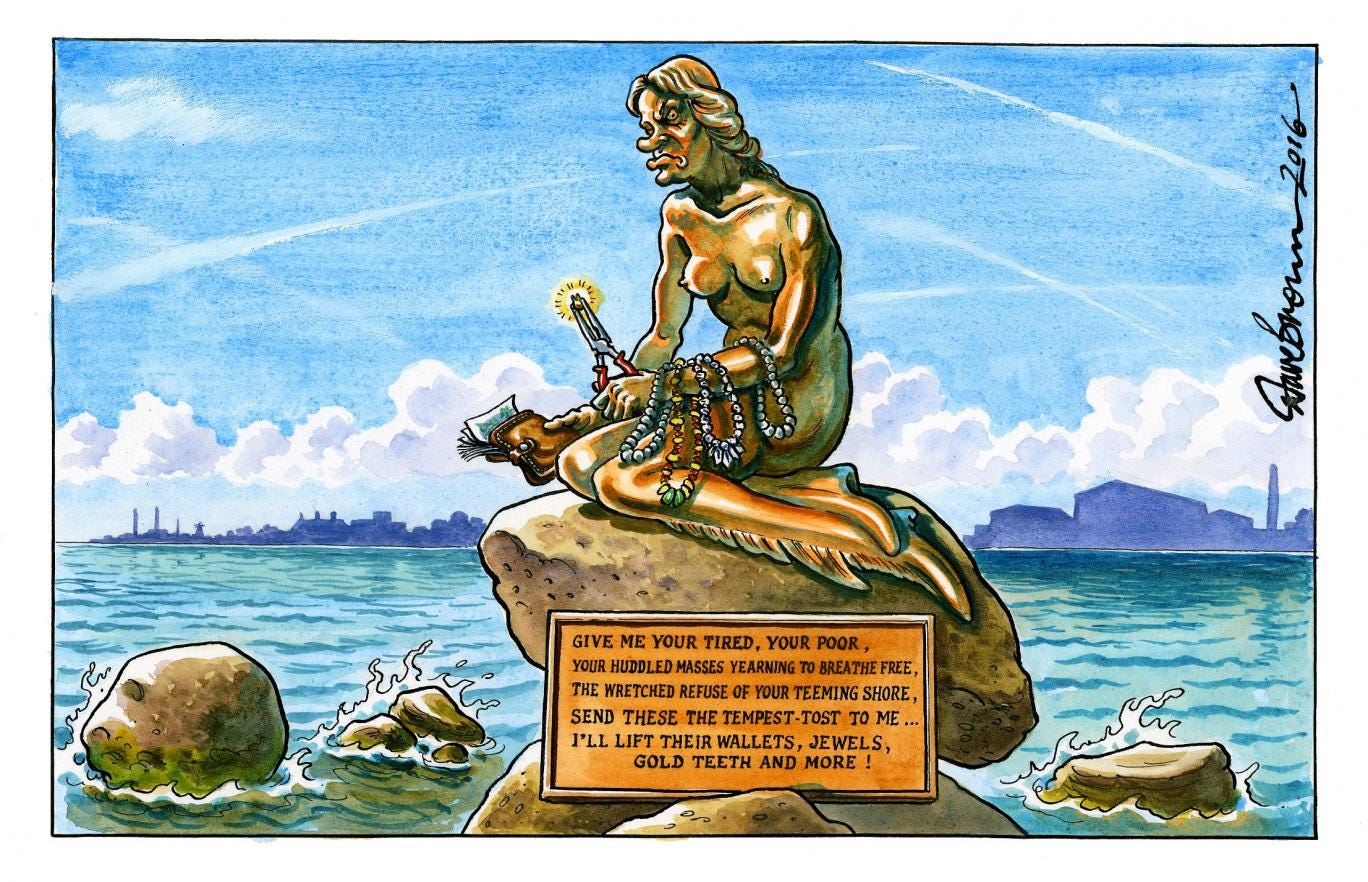 |
| independent.co.uk |
Denmark has one of the harshest records on Syrian refugees of any European Union nation, and this week it got even worse. Back in December, the center-right Danish government proposed legislation that would enable immigration authorities to seize jewelry and other personal valuables from refugees. And on Tuesday, January 26th, the Danish parliament approved the legislation, 81 to 27, with support from the Social Democrats, the largest left-leaning opposition party.
Under the law, any possessions worth more than 10,000 kroner — about $1,453 — will be fair game for immigration authorities to seize. This is up from the original proposal, which set a limit of 3,000 kroner or $436.13.
"Foreigners will always be able to keep assets which are necessary to maintain a modest standard of living, e.g. watches and mobile phones," Mia Tang, head of press for the Danish Ministry of Immigration, Integration, and Housing explained in an email in December (Tang emphasized she's speaking on behalf of the ministry and not herself).
There's a general exemption for items of sentimental value such as wedding rings — as long as their value is under a certain limit. "Assets which have a certain personal, sentimental value to a foreigner will not, as a main rule, be seized unless they have considerable value," Tang notes.
The idea is that the items might pay for the expense of supporting and accommodating refugees. "The Danish Immigration Service shall ensure that asylum seekers receive the necessary support while their asylum applications are being considered. The support includes basic maintenance, health care and accommodation," Tang writes. She continues:
It follows from current rules that an asylum seeker, who brings sufficient means to take care of him- or herself, should not also receive support from the Immigration Service. The asylum seeker is obliged to inform on any means the asylum seeker brings with him or her. The bill presented on 10 December 2015 provides the Danish authorities with the power to search clothes and luggage of asylum seekers — and other migrants without a permit to stay in Denmark — with a view to finding assets which may cover the expenses mentioned above.
The law applies both to refugees entering Denmark in the future and to ones there now.
The ugly history of confiscation in Europe
/cdn0.vox-cdn.com/uploads/chorus_asset/file/5415909/IIww_-_5_maj_1945.jpeg) Tomasz Sienicki
Tomasz Sienicki
The idea's sparked debate in Denmark since Justice Minister Søren Pind floated it in early December, arguing, "I’m talking about a situation in which a man comes along with a case full of diamonds and asks for protection in Denmark. That’s only fair."
Martin Henriksen from the far-right populist Danish People's Party responded by suggesting that even wedding rings should be up for grabs. (He latter backtracked, saying that wedding ring confiscation is "not something that we should strive for" but "could be fair enough in some situations, even though they would be exceptional.")
Martin Geertsen, a member of parliament from the center-right Venstre party currently leading Denmark's coalition government, condemned Henriksen, noting that the idea of seizing wedding rings "awakens terrifying historical images."
Indeed it does. Denmark was occupied by Nazi Germany for five years, from 1940 to 1945, during which time Germany confiscated assets from Jewish Danes, just as it did to Jews across Europe. Danish Jews saw less seized than most nations under Nazi occupation; the Danish government successfully prevented most confiscations until 1943, and Danes who survived the concentration camps generally returned to find their homes as they had left them, as their neighbors prevented Nazis from looting them too thoroughly. But Nazi confiscations still loom large in European historical memory more generally.
Obviously there is no equivalence to be drawn between Denmark's proposed policy and the Nazi seizures. But it's nonetheless a strikingly cruel measure to inflict upon a population of poor men, women, and children fleeing death and chaos in their home country.
"A too high number of refugees put pressure on the Danish society and make it more difficult to ensure a successful integration of those who come to Denmark," Tang insists. Maybe so. But I've never heard of a "successful integration" that began with this kind of humiliating looting.
| theguardian.com |
Σχετικά με τον συντάκτη της ανάρτησης:
Η ιστοσελίδα μας δημιουργήθηκε το 2008.Δείτε τους συντελεστές και την ταυτότητα της προσπάθειας. Επικοινωνήστε μαζί μας εδώ .







κανένα σχόλιο